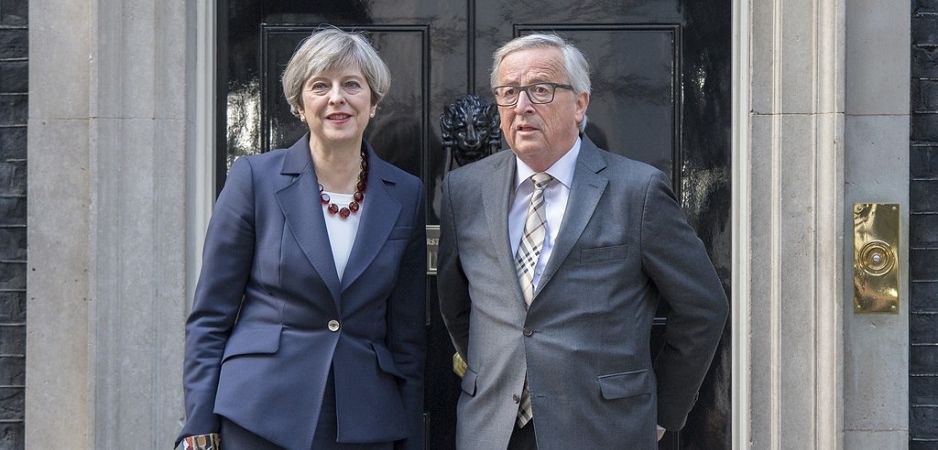Despite the tough talk in the Queen’s Speech, the UK’s position at the Brexit negotiating table has been weakened.
If the results of the British general election revived hope of mitigating Brexit, the long-awaited Queen’s Speech in Parliament has seemingly put all that to bed. In the speech her government penned for the queen, Prime Minister Theresa May decided to stick to her hard Brexit guns: a Great Repeal Bill, an independent customs regime and trade policy, and an end to freedom of movement for the European Union.
The content of the speech will only feed Brussels’ view that the United Kingdom has been behaving like the worst of the boozy holidaymakers it sends to European shores each summer: confused yet increasingly aggressive. That hasn’t changed, even after May’s decision to call a general election that cost the “Brexit Department” two of its four ministers.
The timing to take this strong of a stance could have been better, to say the least. Just a few days before, British and EU negotiators David Davis and Michel Barnier finally sat down to determine a timetable and structure for negotiations.
The Queen’s Speech may have been heavy on tough talk, but it does not change the fact that the UK’s position at the negotiating table has been weakened. As talks get underway, though, that slightly humbled position might actually be an opportunity for both sides. A hard Brexit is no more feasible politically now than it was before the speech. With her leadership in doubt, May needs to drop the combative approach and focus on finding mutually beneficial compromises on critical issues.
Fortunately, the speech still left some windows open for a better Brexit strategy.
Accepting a transitional period
The remarks prepared for the queen clearly rule out permanent membership in the European customs union, but they do not rule out Chancellor Philip Hammond’s proposition that Britain hold off dismantling its customs arrangement with Europe until the UK has reached a new trade agreement with Brussels — a process that could take several years. This is an option favored by British businesses and the EU itself. Maintaining the customs union for longer than currently anticipated would confer several benefits, such as allowing the UK to court potential trade partners while giving trade negotiators the time they desperately need to work out particulars.
As Hammond said himself: “If we’re restricted on being able to enter into new free-trade deals with third countries during an interim period that won’t stop us negotiating and preparing. Normally these deals take quite a long time to negotiate.”
It would also preserve the headway Whitehall has already made, with members of the Gulf Cooperation Council (GCC) in particular. Deepening trade and investment relations with GCC countries like Saudi Arabia and the United Arab Emirates has been a major focus for the government, with a series of high-level visits by Hammond, International Trade Secretary Liam Fox and May herself in the past six months. Tellingly, the prime minister’s first overseas trip after invoking Article 50 was to Saudi Arabia, Britain’s biggest trade partner in the Middle East.
Arab regional leaders are equally keen to boost foreign trade ties with the UK in the midst of their own economic reform programs, and a transitional period prior wouldn’t hurt these envisaged deals, but it would take much of the chaos out of Brexit.
Compromise on free movement
As the issue that most drives anti-EU sentiment in Britain, freedom of movement is one of the thorniest subjects the negotiators will have to tackle. In the words of James McGrory, executive director of Open Britain, the UK needs to be careful “not to pursue a Brexit deal that we know will make people worse off and sacrifice our economic prosperity on the altar of immigration control.”
 A report by two think tanks, the National Institute of Economic and Social Research and the Chartered Institute of Personnel and Development, has recommended any deal ensure employers retain access to both skilled and unskilled workers from the EU. This is hardly a grudging concession to the union. If the UK doesn’t soften its stance, businesses could quickly run into a lack of skilled personnel but also people willing to fill low-skill positions.
A report by two think tanks, the National Institute of Economic and Social Research and the Chartered Institute of Personnel and Development, has recommended any deal ensure employers retain access to both skilled and unskilled workers from the EU. This is hardly a grudging concession to the union. If the UK doesn’t soften its stance, businesses could quickly run into a lack of skilled personnel but also people willing to fill low-skill positions.
The Queen’s Speech made quite clear that the government would be establishing “new national policies on immigration,” but it did not say what those policies would be.
Reject the “no deal” scenario
“No deal is better than a bad deal” makes for a good sound bite, but it would be terrible policy. This holds its own strong interest in ensuring an orderly withdrawal. The reality of the situation was best summed up by European Council President Donald Tusk: “There is nothing to win in this process, and I am talking about both sides. In essence, this is about damage control.”
There will be no controlling of the damage if either side flounces away from the negotiating table with nothing resolved. Instead, it will take sensibly and fairly unpicking the myriad issues that the UK’s exit brings in its wake to prevent harmful destabilization at the precise time Europe gets its feet back under it.
Widen the debate in Britain
If “the will of the people” is truly at the heart of Brexit, the people made their preferences abundantly clear in the general election. In both the election and in recent polling, the British public has rejected the idea of cutting all ties with the EU. The majority of Britons — 69% — disagree with the idea of a hard Brexit, while another 53% think there should be another referendum.
Theresa May would do well to remember that the fierce divisions within her own party over the referendum and the negotiations do not necessarily reflect the public as a whole.
The views expressed in this article are the author’s own and do not necessarily reflect Fair Observer’s editorial policy.
Photo Credit: Number 10
Support Fair Observer
We rely on your support for our independence, diversity and quality.
For more than 10 years, Fair Observer has been free, fair and independent. No billionaire owns us, no advertisers control us. We are a reader-supported nonprofit. Unlike many other publications, we keep our content free for readers regardless of where they live or whether they can afford to pay. We have no paywalls and no ads.
In the post-truth era of fake news, echo chambers and filter bubbles, we publish a plurality of perspectives from around the world. Anyone can publish with us, but everyone goes through a rigorous editorial process. So, you get fact-checked, well-reasoned content instead of noise.
We publish 3,000+ voices from 90+ countries. We also conduct education and training programs
on subjects ranging from digital media and journalism to writing and critical thinking. This
doesn’t come cheap. Servers, editors, trainers and web developers cost
money.
Please consider supporting us on a regular basis as a recurring donor or a
sustaining member.
Will you support FO’s journalism?
We rely on your support for our independence, diversity and quality.








Commenting Guidelines
Please read our commenting guidelines before commenting.
1. Be Respectful: Please be polite to the author. Avoid hostility. The whole point of Fair Observer is openness to different perspectives from perspectives from around the world.
2. Comment Thoughtfully: Please be relevant and constructive. We do not allow personal attacks, disinformation or trolling. We will remove hate speech or incitement.
3. Contribute Usefully: Add something of value — a point of view, an argument, a personal experience or a relevant link if you are citing statistics and key facts.
Please agree to the guidelines before proceeding.